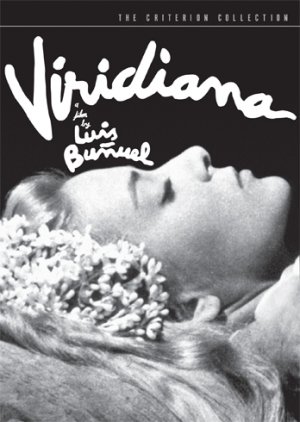
VIRIDIANA
Spain, 1961, 91 minutes, Black and White.
Silvia Pinal, Francisco Rabal, Fernando Rey, Margarita Lozano, Victoria Zinny.
Directed by Luis Bunuel.
Viridiana is considered a masterpiece of Luis Bunuel. Made in the early 60's, it has a certain shock value on its first release, though now it is well accepted. Bunuel, an exile from his native Spain, critical of what happened in Spain under the Franco regime, bitter towards both Church and State, often
explores and visualizes his questions and his hatred.
Viridiana is a nun novice who is required to go home to care for her uncle. Her uncle seduces her. Viridiana reacts in strange ways and becomes a victim both of her uncle and of the household in which she finds herself. There are many striking aspects of this exploration - the critique of the nobility in Viridiana's uncle, the questioning about motivation and religious purity in Viridiana herself, a comment on the poor in the household. There is also a famous sequence when the beggars invade the uncle's household and hold a kind of orgy which is visually presented like a 'Last Supper' sequence. Viridiana is a most interesting film and its themes are well worth exploring. It also bears close relationship to Bunuel's later film Tristana. Fernando Rey portrays the uncle in both films.
1. What was the main audience response to this film? Its response to the plot and characters? To the style of the film? To its themes of society and the individual?
2. The film is considered a masterpiece. Why? Was the film satisfying in itself? The blending of the fanatic and the cinematic? An appropriate and depth exploration of persons and society?
3. Comment on the quality of the black and white photography? The situations and backgrounds? The use of editing?
4. How much of the film was symbolic? The character of Viridiana, her behaviour? The particular details of the skipping rope, the tree, the beggars in the backwood etc? How real were the events meant to be? How well did the film blend symbolism and realism?
5. What insight into society did the film offer? Viridiana's social back~ ground, her place in the convent? Her being sent home to her Uncle? Don Jamie and his household? The housekeeper in relationship to Don Jamie and the house? The nephew and his girlfriend emphasizing the modern atmosphere? The beggars and their background? This particular house and its people as an allegory of the wider world?
6. How well was the character of Viridiana explored? As an ordinary girl, her religiosity and piety? Her being sent home? The effect of being sent home? Good but unreal? The effect of Don Jamie's wounding of her pride? The sexuality? The sleep-walking scene and its significance? Her being dressed in the bridal clothes? Her welcoming of the beggars? Serving of them? Her praying while the house was being renovated? The clash of personality and style with the nephew? The effect of the pessimism on her? The awakening of her sensuality? Liberating or not? Her final decisions? What future did she have? How much was good and how much was bad in her? What did she symbolize about the good person in the world?
7. What did Don Jamie represent? Social decay? Morality? His memories of his wife? The effect of the sleep-walking? His ravishing Viridiana's pride? His relationship to the house-keeper? The irony of his death with the skipping rope?
8. The character of the nephew,, callous, modern, destroying yet saving? His relationship with his mistress, the house-keeper, Viridiana? What response did he draw from her? Did she see him as he was or did she romanticise him?
9. The impact of the beggars in the film? Virdiana's romantic idea of poverty? Her kindness and their gross greediness? Their exploring of the house? The banquet behind her back? The mock da Vinci, Handel’s Halleluja Chorus? The callousness of greed, running away, the rape? How romantic was Viridiana's view of these beggars and her service of them?
10. The effect of all this, especially the rape and the death on Viridiana? Her disillusionment?
11. The dramatic impact of the ending with the menage a trois? The rock-and-roll song?